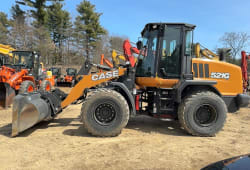Understanding Average Annual Value in Construction: Definition, Calculation, and Its Role
3 Min read
)
February 13, 2025
Average Annual Value (AAV) is a key financial metric used to assess the long-term worth of an asset, investment, or project. It represents the average yearly value of an asset over a specific period, helping construction companies evaluate profitability, depreciation, and financial planning.
In the construction industry, AAV is particularly relevant for equipment valuation, project costing, and investment analysis. Understanding AAV helps companies optimize budgeting, make informed purchasing decisions, and ensure long-term financial stability.
This article explores Average Annual Value in construction and its impact on equipment management and project costs.
What Is Average Annual Value in Construction?
1. Role of AAV in Construction Equipment Valuation
Construction companies use AAV to estimate the depreciation and resale value of heavy machinery and tools. Since construction equipment is a significant investment, understanding AAV helps businesses decide whether to lease or purchase equipment.
Key factors influencing AAV in construction equipment include:
Initial Purchase Price – The cost of acquiring the equipment.
Depreciation Rate – The annual decrease in value due to usage and market conditions.
Lifespan of Equipment – The total expected operational life.
Resale or Salvage Value – The price at which the equipment can be sold after use.
Formula for AAV of construction equipment:
2. AAV’s Impact on Project Costing and Budgeting
In construction projects, AAV is used to calculate average annual costs for equipment and material investments. It ensures accurate budgeting by distributing costs over the project’s duration, preventing budget overruns.
Example: If a construction company purchases a $500,000 crane with a 10-year lifespan and an estimated resale value of $50,000, the AAV calculation would be: This means the crane’s cost is allocated at $45,000 per year in the company’s financial planning.
:format(webp))
Factors Influencing AAV in Construction
Several elements impact AAV in construction projects:
1. Inflation and Material Costs
Rising material and labor costs directly affect equipment and project expenses, impacting AAV calculations.
2. Equipment Maintenance and Lifespan
Regular maintenance can extend the operational lifespan of construction machinery, affecting its depreciation rate and overall AAV.
3. Technological Advancements in Construction
Modern technology, like AI-powered equipment maintenance and smart construction solutions, can extend asset life and enhance efficiency, modifying AAV calculations.
4. Economic Conditions and Market Trends
The demand for construction services, interest rates, and overall market conditions influence AAV by affecting asset values and investment returns.
Conclusion: Why AAV Matters in Construction
Understanding Average Annual Value (AAV) is crucial for construction professionals and financial planners. Whether calculating equipment depreciation or assessing long-term project costs, AAV helps optimize investment decisions and budgeting strategies.
Key Takeaways:
✔ AAV in construction determines equipment costs and influences leasing vs. buying decisions.
✔ Accurate AAV calculations ensure better financial planning and cost allocation in construction projects.
✔ Economic trends, inflation, and technology advancements impact AAV and construction asset valuation.
By leveraging AAV insights, construction businesses can make smarter financial decisions and maximize long-term asset value.







